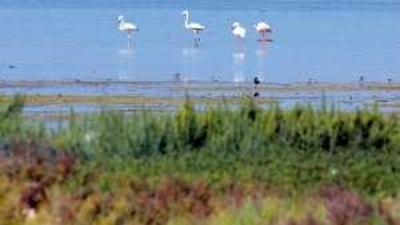ABU DHABI // Rare birds are in harm's way as many wetlands in the Middle East face encroaching development, scientists and environmentalists warned yesterday. Scientists from across the region and overseas gathered in Sharjah as part of a three-day event organised by the emirate's Environment and Protected Areas Authority to discuss the status of local shorebirds. For the past 10 years, the Conservation Workshop for the Fauna of Arabia has been held annually to address the conservation status of various rare animals.
The workshop also serves as a discussion forum on how to create protected areas for the region's rich fauna. After discussions on mammals such as the Arabian leopard, birds of prey and marine invertebrates, the experts started looking into some of the 90 local species of shorebirds, such as waders, herons, spoonbills and ibis. "All wetland birds are tied to natural wetlands," said Paul Vercammen, the operations manager at the Sharjah Breeding Centre for Endangered Arabian Wildlife.
"Almost all coastal wetlands [here] are developed or earmarked for development." The issue is a particular problem for the UAE. While some wetlands such as Ras Al Khor in Dubai and Khor Kalba in Sharjah are protected, many more are being destroyed. At Khor Al Beidah in Umm Al Qaiwain, which is an important refuelling stop for migratory birds and hosts 85 species of birds as well as fish and turtles, the natural habitat of mangroves and sand dunes borders the site of an Emaar development of villas, townhouses and a marina.
The wetlands of the UAE and the rest of the Arabian Peninsula are important stops for migratory birds, which fly thousands of kilometres between Siberia and Africa. The birds need to have points during their journey to stop for food or to breed. Resident populations will also suffer as their habitat is destroyed. The group of specialists, from Qatar, Jordan, Saudi Arabia, Bahrain, Oman, Yemen and the UAE, are evaluating the status of three of the region's most threatened shorebirds.
The bald ibis, sociable plover and slender-billed curlew have been flagged as critically endangered globally on the Red List of Threatened Species, by the International Union for Conservation of Nature. Mr Vercammen said there was a need to take a closer look at the specific regional challenges these three species face. The delegates are also discussing ways to improve the region's existing protected areas, some of which are understaffed, badly funded and do little to enforce conservation rules.
The workshop is a first step towards the establishment of what experts refer to as "trans-boundary conservation areas" - protected areas that cross political borders. Dr Philip Seddon, from the University of Otago in New Zealand, one of the moderators of the workshop, said that for migratory species, political boundaries are "artificial" and "make no sense". "There is a need for trans-boundary agreements ... we need to start more formal discussions."
At last year's gathering, delegates outlined the three species that would benefit from such an agreement: the Arabian leopard, Arabian oryx, the region's flagship species, one that has been extinct from the wild since 1972, and the dugong. Protecting the dugong will require co-operation from Qatar, Bahrain, Saudi Arabia and the UAE. Yemen and Oman need to work together to create a viable protected area for the Arabian leopard, as do Saudi Arabia, Oman and the UAE to reintroduce the free-ranging populations of Arabian oryx.
The UAE is in the process of setting aside a 10,000-square-kilometre area on the border with Oman and Saudi Arabia. Arabian oryx have been released there over the past two years and are successfully breeding. A much larger area on the other two sides of the border is required to achieve a self-sustaining, migratory population of Arabian oryx. vtodorova@thenational.ae

